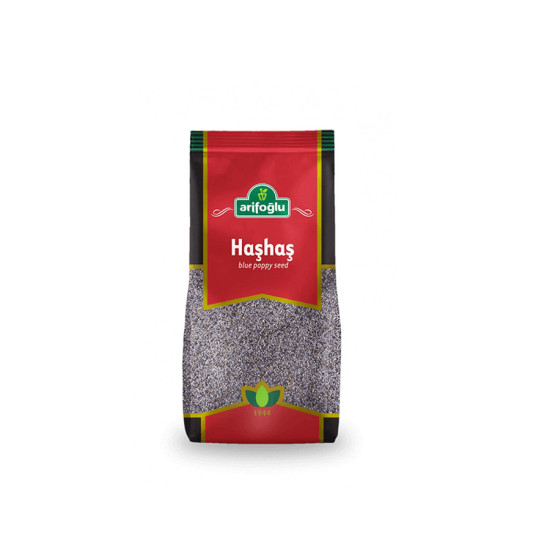
Turkish Blue Poppy Seeds
10USD
Ex Tax: 10USD
Poppy Seed, 250 G
Blue poppy seeds; small, oily, and high-fat seeds, considered one of the seeds used in cooking and bakery preparation. It is distinguished for its many benefits in terms of the body’s general health in addition to benefits related to the health of the skin and hair.
Poppy Plant
- A flowering plant native to East of the Mediterranean and West of Asia. It is also known as the “opium poppy” because it is the source of opium that is a narcotic drug that has been used for centuries due to its sedative and pain-relieving properties.
- Poppy plant height may reach up to 4 feet. It produces large showy flowers in shades of white, pink, red, or purple. The flowers bloom in late spring and summer followed by seed pods containing the plant’s seeds.
- Poppy plant is also grown for its seeds that are used in cooking, baking as a baking or pastry tray. The seeds may be white, gray, or blue. They are often used interchangeably in culinary applications.
- Whereas the poppy plant has a long history in medicals uses, it is also a controlled substance due to the possibility of drug abuse. The law regulates the cultivation, possession, and distribution of opium and its derivatives in many countries. Therefore, it is important to use poppy seeds for culinary purposes only and to abide by all relevant laws and regulations.
The Difference Between Blue and White Poppy
- The main difference between blue and white poppy is the color of the seeds. Blue poppy produces blue-gray colored seeds while white poppy produces white seeds.
- In terms of use, both types can be used in cooking, baking, and as a cover for bread and pastry. They can be interchangeably used in many culinary applications.
Blue Poppy Seeds
- Small oil-rich seeds that come from the poppy plant known also as “papaver somniferum”, distinctive for its blue-gray color and slightly nutty-flavor, used commonly in cooking, baking and as a cover for bread and pastry.
- Blue poppy seeds are often used in the cuisines of Eastern Europe and the Middle East as they are added to pastries, bread, and salty dishes. In the Indian cuisine, it’s used in desserts and sweets such as halva. It’s also a common ingredient in bread and other baked in goods the Western cuisine.
- It’s important to note that blue poppy seeds are legal and widely used in culinary applications. The opium poppy plant itself is a controlled substance due to the possibility of drug abuse, therefore, it’s important to use poppy seeds for cooking purposes only.
Poppy Seeds Benefits
Poppy seeds are considered a good source of important nutrients including healthy fats, proteins, and minerals such as calcium, magnesium, and zinc. Here are some potential health benefits of poppy seeds:
- Poppy seeds are considered a good source of calcium which is important for preserving strong and healthy bones.
- Poppy seeds contain a high percentage of carbohydrates that can provide a quick source of energy as well as healthy fats and proteins that can assist maintaining energy levels over time.
- Poppy seeds are considered good source for healthy fats including omega 3 and 6 fatty acids that may assist lowering blood cholesterol levels and minimizing the likelihood of developing heart diseases.
- Poppy seeds are a good source of dietary fiber that may assist regulating digestion and prevent constipation
- Poppy seeds contain small amounts of the amino tryptophan acid that may assist enhancing mood and relaxation.
Poppy Seed Calories
Poppy seeds contain high percentage of calories due to its fatty content, yet it may be a nutrient addition in a balanced dietary system when moderately consumed.
Here are the estimated number of calories or variant service sizes of poppy seeds:
- One teaspoon of poppy seeds (around 2.5 g): 16 calories
- One tablespoon of poppy seeds (around 8 g): 48 calories
- One ounce of poppy seeds (around 28 g): 144 calories
- 100 g of poppy seeds: 525 calories.

